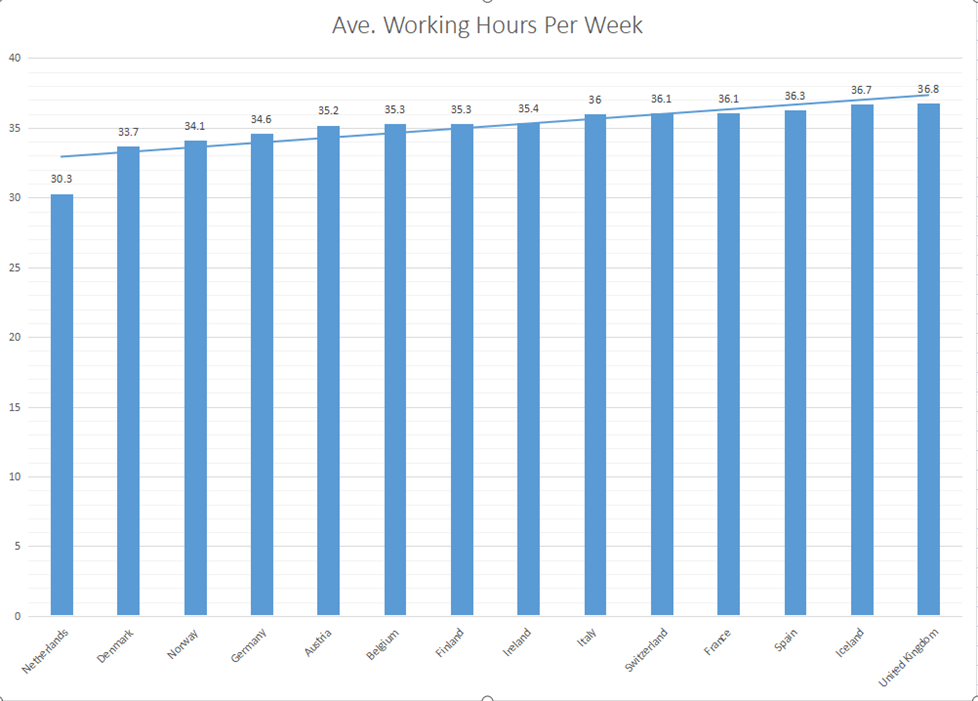Is a 4-Day Work Week Feasible?
Do you ever feel like the weekend is too short? Or that all you do is work? If so, you may be experiencing symptoms of work-related stress.
According to Gallup’s State of the Global Workforce 2021 report, workers around the world feel anxious, sad, and stressed.
- Only 21% of employees feel engaged at work
- Only 33% of employees thrive in overall well-being
- Employees in South Asia have the lowest scores in terms of well-being
- Only 45% of workers think now is a good time to find a job
- Workers in the US and Canada tend to be more stressed but also more engaged
- Low engagement at work costs the global economy $7.8 trillion
In order to counter the dismal reality of work around the world, a new initiative has been proposed: a 4-day work week. This means giving workers more time to spend on their family, hobbies, and other personal pursuits.
In 2018, a nonprofit community called 4 Day Work Week Global has partnered with New Zealand firm Perpetual Guardian to test whether a change from the typical 5 to 4 days of work a week is possible. After their trials, the following conclusions proved promising.
- 63% of businesses found it easier to recruit and retain talent
- 78% of workers said they are less stressed and are happier
After receiving overwhelming support and interest, they have now partnered with organizations all over the world to try to reproduce the success they had initially.
Overall, the 4-Day Work Week movement seeks to address three main problems:
- Employee burnout
- High employee turnover causing a decrease in productivity
- Climate change
It sounds like a revolutionary change, but reducing work hours is barely a new idea. As early as the 1920s, Henry Ford adopted a 40-hour work week for his employees. Only in 1932, not even a century ago, did the USA officially start adopting a five-day work week, creating the weekend as we know it today. Before that, workers toiled from Monday to Saturday, often spending Sundays drunk and turning to work hangover the next day, which in part convinced the companies to also allow Saturdays off so workers can have their fun and also have time to recover.
Can such a sweeping change be replicated today?
It might.
Let’s look at countries around the world that are spearheading the global shift toward a 4-day work week.

Image by Jopwell from Pexels
Countries with 4-day work weeks
Most people think of the typical work week as divided into working days and the weekend. But that may change soon. Many countries around the world are slowly testing out the viability of a 4-day work week. In fact, the United Arab Emirates has officially become the first country in the world to adopt this type of work arrangement.
Other countries that are looking to shorten their working days include:
United Arab Emirates
In January of 2022, the UAE’s four-and-a-half days work week officially took effect. Before this, the UAE had a Friday-Saturday weekend, which is standard in the Gulf nations to accommodate religious activities. This move aims to align the UAE’s workforce with the western schedule while still accommodating the country’s cultural norms.
Australia & New Zealand
Both countries will start their 6-month-long four-day work week trial in August of 2022. Participating companies will implement reduced work hours with no salary reduction for the employees.
Belgium
In an effort to raise the country’s employment rate from 70.6% to 80% by 2030, the Belgian government okays an employment deal that will make a 4-day work week possible for people who want them. While the number of hours employees need to render is still the same (40 hours), they will have more flexible options under this reform.
Canada
Interest in a 4-day work week is also in full swing in Canada where some private companies are experimenting with its implementation to see how it benefits staff and impacts productivity.
Related: Different Work Cultures Around the World
Iceland
Iceland is one of the earliest countries to experiment with shorter work hours. From 2015 to 2019, it pilot tested a 35 t 36-hour work week involving around 2500 participants. The trial was considered a success and resulted in nearly 90 percent of the country’s workforce now working reduced hours with no pay cut. The seminal trial has since inspired other countries to follow suit.
United Kingdom
In what is considered the world’s biggest 4-day work week trial, 70 companies in the United Kingdom involving some 3, 300 participants have embarked on a pilot to test the viability and impact on productivity of shorter working hours. The test is set to run for six months starting June 2022.
Denmark
In 2019, the Odsherred Municipality in Denmark became the first local authority in the country to test a 4-day work week set up. Denmark, however, is no stranger to short working hours, having an official 37-hour work week.

Countries with the Shortest Average Working Hours Per Week as of 2021
Data from https://stats.oecd.org/
Austria
Numerous private companies in Austria have taken the initiative of reducing workers’ work hours by offering flexible options including a 4-day work week. One company that reduced their work hours to just 30 hours in 2018 has seen a decrease in employee stress, with employees reporting they feel healthier than before.
Spain
Reduced working hours are also slowly gaining momentum in Spain as some 150 companies test out a 4-day work week schedule. This move is heavily supported by Spain’s left-wing party which made it a condition for its support of the national budget. Unlike other trials, however, some companies reduce payments for those who opt to participate, making many reluctant to consider the shift.
Germany
Following Belgium’s announcement of offering a four-day working week, German unions are considering the same path for its 45 million-strong workforce. Included in the considerations are fewer working hours so workers wouldn’t have to struggle with long work days. Right now, private German companies offer some version of the 4-day work week initiative in order to attract both local and international talent.
Ireland
Thousands of Irish workers join countries like Australia, New Zealand, and the UK in the latest round of trials for the 4-day work week. Workers will get 100% of the pay, working 80% of the usual time, as long as they commit to maintaining productivity.
Norway
Norway already has the shortest average working hours per week next to The Netherlands and Denmark. Right now, many companies based in Norway are already offering flexible working hours for their employees. Norway’s Working Environment Act establishes workers’ rights to shorter working time for shift work, reduced working hours due to health, social, or welfare reasons, and well as flexible working hours as long as it does not negatively impact the company.
Switzerland
Switzerland is another European country experimenting with reduced working days. Some Swiss companies have started offering the option to work only 4 days a week but with an unchanged number of working hours. However, some believe it might not work with larger companies as it may cause stress and lead to overtime.
The United States of America
Many American companies have trialed the 4-day work week in recent years and some have already started adapting it. However, a new bill proposed in the state of California might create a significant influence throughout the country if it passes. The US also joins Canada — altogether amounting to 28 companies from North America — as they undergo a 6-month-long experiment to test the feasibility of this setup.
Related: Different Work Cultures Around the World
The Netherlands
In April of 2022, Dell started offering its workers in The Netherlands a four-day work week. As early as 2021, Dutch unions have already called for the government to implement a 30-hour work week, given that 75% of the workforce are part-time workers. Because most of the people in The Netherlands choose to work part-time, the country has the shortest average working hours in the world.
Japan
Japan’s move to allow workers to work only 4 days a week came as a surprise given Japan’s reputation as a work-centric culture. In 2021, the country’s annual economic policy guidelines include a new recommendation for companies to allow their staff to work for shorter days. Many Japanese firms have now followed suit.
Conclusion
As of the moment, Europe seems to be leading the change in reduced work hours. The conclusions of trials in the UK, US, and other countries will be pivotal in determining whether there will be a worldwide adoption or not.
Are you ready for a 4-day workweek? How do you think this change will impact your career and lifestyle?
At Life Intelligence Group, we are investing in change and developing products to help people optimize their lives and adapt to new lifestyle changes as these. Our pilot, TaskSpur, allows you to track all your personal, professional, career, and health goals and tasks in one platform. Check it out!
Download TaskSpur on Android | Download TaskSpur on your iPhone
Sign up or Login on your browser
References:
- https://www.4dayweek.com/anzpilot
- https://www.aa.com.tr/en/europe/belgian-government-agrees-on-4-day-workweek/2616527
- https://www.cbc.ca/news/canada/british-columbia/four-day-work-week-1.6482456#:~:text=Others%20in%20Canada%20experimenting%20with,of%20Guysborough%20in%20Nova%20Scotia.
- https://www.euronews.com/next/2022/06/06/the-four-day-week-which-countries-have-embraced-it-and-how-s-it-going-so-far#:~:text=Iceland%3A%20One%20of%20the%20leaders,part%20in%20the%20test%20phase.
- https://www.weforum.org/agenda/2022/06/four-day-work-week-uk-trial/#:~:text=More%20than%203%2C300%20employees%20at,commitment%20to%20maintain%20100%25%20productivity.
- https://www.thelocal.dk/20190916/danish-municipality-introduces-four-day-working-week/
- https://denmark.dk/society-and-business/work-life-balance
- https://talentor.com/blog/4-day-week-with-a-full-salary#:~:text=The%204%2Dday%20week%20is,Austria%20desire%20flexible%20working%20hours.
- https://www.euronews.com/next/2022/07/15/heres-why-a-four-day-working-week-trial-in-spain-has-not-been-a-runaway-success
- https://english.elpais.com/economy-and-business/2022-06-20/the-four-day-working-week-theyd-have-to-pay-me-double-to-go-back-to-the-old-schedule.html
- https://www.destatis.de/EN/Press/2022/03/PE22_139_132.html#:~:text=WIESBADEN%20%E2%80%93%20Roughly%2045.0%20million%20people,Federal%20Statistical%20Office%20(Destatis).
- https://4dayweek.io/companies/germany
- https://www.rte.ie/news/economy/2022/0606/1303310-four-day-week/
- https://www.nho.no/en/english/articles/basic-labour-law/#:~:text=According%20to%20the%20Working%20Environment,is%2037.5%20hours%20per%20week.
- https://lenews.ch/2022/01/22/the-concept-of-a-4-day-week-makes-headway-in-switzerland/
- https://www.newsweek.com/every-us-company-4-day-workweek-full-list-1697943
- https://www.cnbc.com/2022/04/01/four-day-workweek-pilot-program-is-now-underway-in-the-us-and-canada.html
- https://www.newsweek.com/every-us-company-4-day-workweek-full-list-1697943
- https://www.iamexpat.nl/career/employment-news/dutch-union-calls-standard-30-hour-work-week-netherlands
- https://www.theregister.com/2022/04/11/4day_workweek/
- https://www.japantimes.co.jp/news/2022/05/03/business/four-day-working-week-japan/
- https://www.dw.com/en/japan-work-life-balance/a-57989053
- https://www.theguardian.com/world/2018/oct/02/no-downside-new-zealand-firm-adopts-four-day-week-after-successful-trial
- https://www.gallup.com/workplace/349484/state-of-the-global-workplace-2022-report.aspx
- https://hbr.org/2022/06/stressed-sad-and-anxious-a-snapshot-of-the-global-workforce